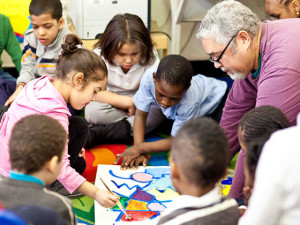The Importance of Praise
by Ellie Richardson 
Through my weeks of volunteering, I’ve noticed that one girl in particular doesn’t like to do art projects because she “doesn’t know how to draw”. At first, this seemed silly to me; it didn’t matter if the art was good or not, so long as she expressed herself. But when I saw her look around at the other girl’s drawings, then immediately erase what she’d produced, I could see what was going on. At the age of 6, someone has already planted the idea in her brain that there is a right way to do art and a wrong way to do art, and, (more importantly), that the way she does art is the wrong way.
The girls in the program where I volunteer come from mostly low-income families and go to public schools; being able to express oneself is a luxury that very few of these girls have been given. This girl was discouraged by her “inability” to produce “good” art, because she has not been told that any of her work is “good”.
It is extremely important for children, in any situation, to hear praise for their work, reguardless of whether or not it is “good”. Hearing praise gives children the confidence they need to be able to have success later in their lives. This girl has clearly recieved little to none of this positive feedback, and therefore is very critical of herself to a point where she cannot produce any work confidently.
The driving force of her discouragement probably comes from whoever’s opinion matters to her most, most likely a parent or family member. If she does not recieve positive feedback at home, then how can she possibly have enough confidence to show her work to others at school, where the opinions on her work may very from person to person.
Although it is important for children to develop the ability to take in constructive criticism for their work so they can keep learning and adding on to what they’ve accomplished, it is even more imortant that the first feedback they recieve is positive. That way, they can develop a sense of self encouragment for all of their work, including work that recieves no positive feedback whatsoever.
It is the first positive feedback that creates that little voice in their heads that tells them they can do whatever they set their minds to, even when all odds are facing against them. This is especially important for children of low-income families, for, later in life, almost all the odds will be against them.
Most low-income parents want to spare their children the pain of rejection, fearing that they will face lots of it in their lives, so they try not to create false hope for them by not praising their work. However, as good as these intentions are, not giving positive feedback to children may prove to have a more detremental effect, creating children who do not have enough confidence in themselves to do anything outside of their comfort zones. These children will grow into adults who aren’t confident enough to go to college, or ask their boss for a raise, or even give their own children positive reinforcement.
Our children need us to tell them that they’ve done a good job, without which, the future of our country looks very dim.


beautiful blog dear ellie!!! i do so agree. i can’t remember the source right now, may be parker palmer (will locate the source hopefully) who said people remember criticism but they act on and benefit from praise. i’ve also been reading about “Strength Finders” – again will have to find the source, tho you can just google it – the idea being companies will do much better to help people shore up, improve on strengths rather than concentrating on weaknesses, which is the usual course.
proud of you! will be reading your blogs in future – oh have so much fun at smith! ,